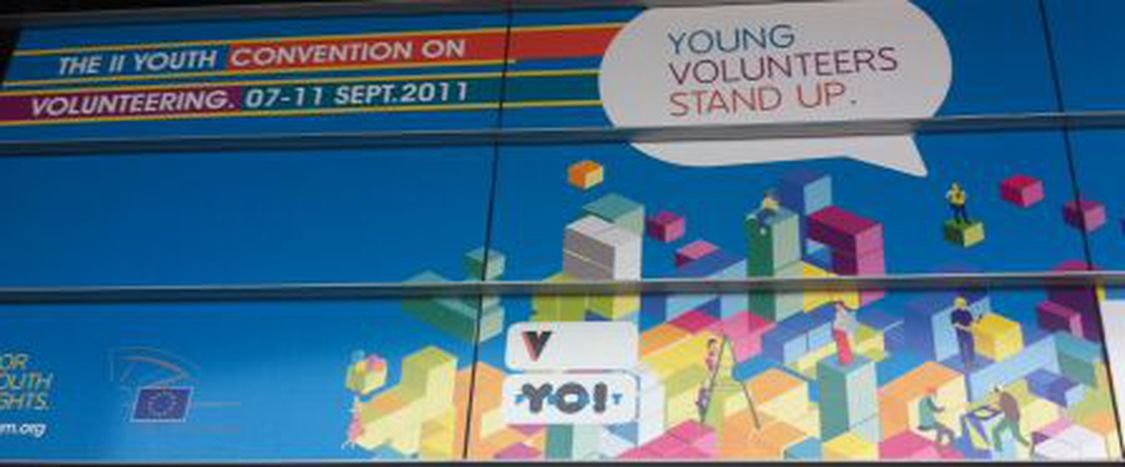
The many faces of volunteering: European and Austrian perspectives
Published on
By Daniel Spichtinger
In case you haven’t notice yet- the EU has declared 2011 the European Year of Volunteering. But what does it mean to volunteer? And is everything about volunteering nice and shiny or are there also some potential pitfalls and problems associated with it? Not everyone agrees even on a common definition of volunteering.
Most experts say that it is a voluntary activity (so not due a legal obligation), that there is no financial gain and it is for the benefit of people outside the immediate family. However, while the OECD only measures formal volunteering, that is voluntary work for an established organisation, the Austrian Report on Volunteering (for instance) also includes informal volunteering, which additionally covers privately given help (for example going shopping for your elderly neighbour). Accordingly, the figures on how many people do voluntary work vary considerably. The OECD study identified on average 2,9% of the population of the 26 member states being involved in formal volunteering in an organisation. While this is a relatively low number, those that are involved devote a lot of time to it. In comparison the 2009 report on volunteering in Austria found 43,8% of the population engaged in formal and informal volunteering activities.
Which kind of voluntary work do people exactly do? In May 2011 the Association “Citizens of Europe” organised a Citizen’s Convention in Landau, Germany which brought together many volunteer organisations from across Europe, showcasing the variety of volunteering cultures and activities from countries ranging from Austria to the UK, Ukraine, Germany, Hungary, Turkey, Italy and Belorussia. For the Austrian situation, for instance, the following characteristics have been established in the 2009 report:
Although non political in nature, many formal volunteering organisations, such as the pensioners organisations, sport clubs, youth organisations and cultural groups are linked to the two traditional big parties in Austria, the Social Democrats or the Conservatives, which means there are often at least two of them Since Austria is a federal state, local voluntary organisations can operate fairly autonomously from the central headquarters. For instance the red cross in the province of Upper Austria can decide on its activities without too much interference from the Vienna based umbrella organisation (“Red Cross Austria”). Furthermore a lot of charitable organisations which include volunteers are related to the church, for instance the “Caritas”, a big social organisation helping the poor and socially disadvantaged which is affiliated to the Catholic Church (its head is usually from the church).Volunteering is also much stronger in the Austrian countryside than in the cities. Many activities that are undertaken by professionals in the bigger towns are done by volunteers in small villages. Most notably this includes fire-fighters and rescue services. Being part of the local voluntary fire fighters brings old and new inhabitants together and connects the community, not least through local festivities such as annual fire-fighter party (always a good excuse to get drunk for a noble cause). Another popular activity in smaller towns are common undertakings to make the village more beautiful, through financing and planting new flowers for instance. There is, however, a strong expectation that inhabitants will contribute to some of these activities and not donating to the local fire-fighters can easily lead to some less then friendly comments and even social ostracism.
People primarily engage in volunteering because it is fun, to help others and, if they are retired, to remain actively involved in an activity which makes sense. But volunteering can also be useful in acquiring soft skills like working together as a team, organisational management and time management. However, the president of one Austrian charitable organisation has also warned that volunteering should not be exploited by the state as a way to reduce costs in social services, such as healthcare Volunteering traditions may differ in Western and Central European Countries and more can be done to reward volunteers in these countries (such as tax benefits) but in general EU countries encourage and support volunteering (also because social services would be difficult to maintain otherwise). Further east, however, things look less rosy. At the Citizen’s Convention a participant from Belorussia told the audience of state repression towards any activities of citizens which are not expressively sanctioned by the government. In Belorussia volunteering can lead to police brutality and imprisonment of the volunteers. Additionally, voluntary organisations face difficulties in staying legal and not being banned.
The EU year of volunteering certainly helps to raise the profile of volunteering, to encourage people to volunteer and also to say “thank you” to those already dedicating some of their free time to a good cause. It remains to be hoped that some positive effects of the year of volunteering outlast 2011.
Sources and further information:
Veerle, Miranda (2011) “Cooking, Caring and Volunteering: Unpaid Work around the World”. OECD Social, Employment and Migration Working Papers No 116.
Citizens of Europe (2010) Open Forum 10 Brugge: Faces and Fakings of Volunteering.
Citizens of Europe (2011) Citizens Convention 2011 http://panorama.citizens-of-europe.eu/?p=2809
Bundesministerium für Arbeit, Soziales und Konsumentenschutz (2009) Freiwilliges Engagement in Österreich. 1. Freiwilligenbericht. Institut für Inderdisziplinäre Nonprofit Forschung an der Wirtschaftsuniversität Wien (NPO-Institut)
Die Johanniter (2011) Ehrenamt hat viele Gesichter. Das Magazin der Johanniter Unfall Hilfe in Österreich. Ausgabe 2.2011
Picture Source: top picture Volunteering Convention, Brussels ( c Daniel Spichtinger)



